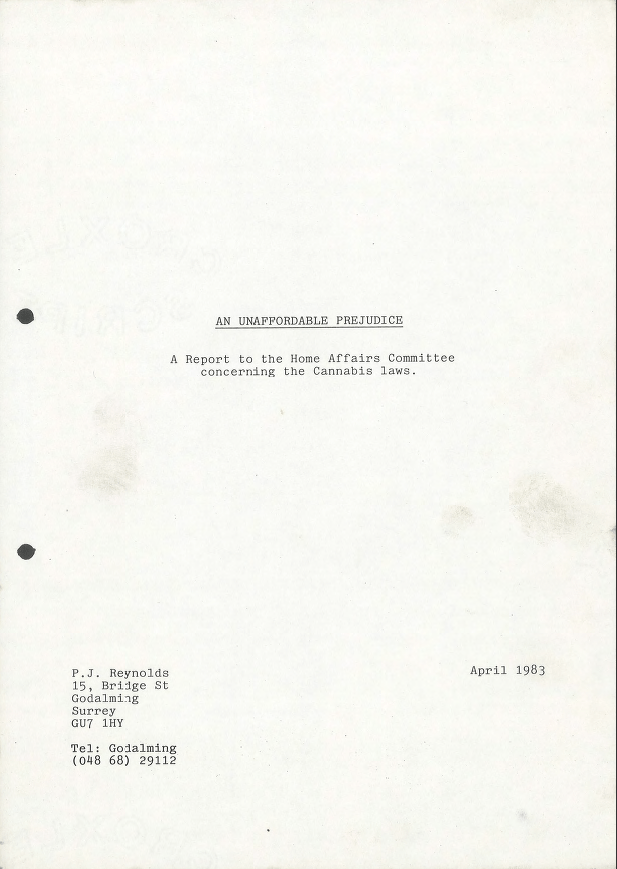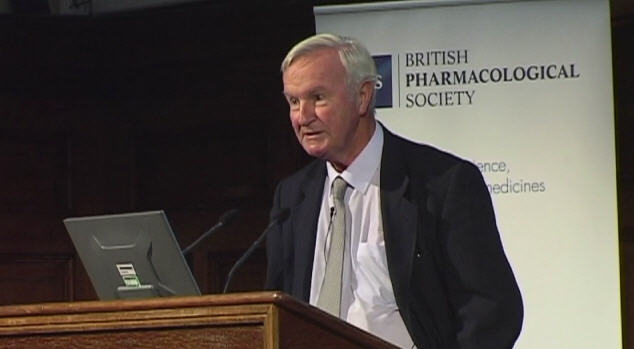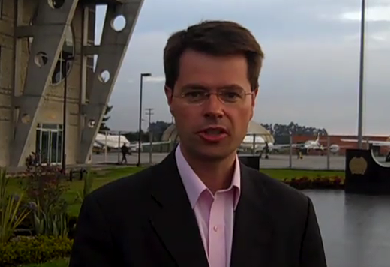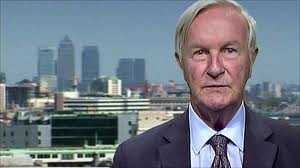Posts Tagged ‘British Medicinal Cannabis Register’
An Unaffordable Prejudice – A Report To The Home Affairs Committee Concerning The Cannabis Laws
Probably the worst part of becoming leader of Cannabis Law Reform (CLEAR) has been learning how to deal with the abuse and vitriolic jealousy that has been directed at me.
In fact it started even before my election when I set up the British Medicinal Cannabis Register (BMCR). Immediately, some individuals accused me of being an undercover cop, of trying to cheat medicinal users into incriminating themselves. I was astonished at the divisiveness, backstabbing and bitterness within the cannabis community. I was accused of making money out of it and exploitation – ridiculous ideas to anyone with an ounce of common sense
You will know the rest. It got even worse. A Peter Reynolds “hate site” was set up by a psychotic breakaway from UK420 which made a series of completely ludicrous and false allegations about me. Everything I had ever said about myself was untrue, apparently. I was said to be a fascist, a Jew hater, a racist, etc, etc, etc.
I published evidence of my previous work and the trolls and numpties faded away – but not completely. Even in quite close proximity, some who you might expect to be supportive of the progress we have achieved recently, have grumbled and groaned and suggested that I have not been truthful about my record in the cannabis campaign. Those who prefer to look backwards rather than forwards continue to quibble.
Last week my ex-wife cleared out her loft. My sons salvaged a copy of the report I submitted to the Home Affairs committee nearly 30 years ago. It was in 1983, not in 1978 as I had said previously – which will probably bring yet more accusations!
So here it is, printed on a daisy wheel printer, with finger marks and smudges intact. It’s amazing really because this was written even before the discovery of the endocannabinoid system and that is the only real difference in the argument I presented then from what I would say today.
Bringing Cannabis Back Into The Medicine Cabinet
Professor Les Iversen delivers the Inaugural President’s Public Lecture during the BPS Winter Meeting, London 2010.
Prof. Iversen is the current chairman of the Advisory Council on the Misuse of Drugs and a founder council member of the British Medicinal Cannabis Register. He is also the author of many publications and books on cannabis. He is famous for his article in The Times headlined “Cannabis. Why It’s Safe” and for saying that cannabis is “one of the safer recreational drugs”.
He walks a courageous and tricky tightrope between science and his ACMD role. He is the government’s chief drug adviser so at least we know they are getting good advice even if they don’t act on it.
You can watch the lecture here.
Professor Iversen has also provided me with a copy of his Powerpoint presentation from the lecture which you can download here.
Breakthrough In The Drugs Debate!
Tomorrow, Bob Ainsworth MP, former Home Office drugs minister and Secretary of State for Defence, will call for the legalisation and regulation of drugs. He is to lead a Parliamentary debate in Westminster Hall, at 2.30pm on Thursday 16th December 2010.
Great credit for this must go to the inestimable Transform Drug Policy Foundation, which has led the fight against prohibition. This is an extraordinary breakthrough. The news literally brought tears to my eyes. We have fought so long for such progress.
Mr Ainsworth said;
“I have just been reading the Coalition Government’s new Drugs Strategy. It is described by the Home Secretary as fundamentally different to what has gone before; it is not. To the extent that it is different, it is potentially harmful because it retreats from the principle of harm reduction, which has been one of the main reasons for the reduction in acquisitive crime in recent years.
However, prohibition has failed to protect us. Leaving the drugs market in the hands of criminals causes huge and unnecessary harms to individuals, communities and entire countries, with the poor the hardest hit. We spend billions of pounds without preventing the wide availability of drugs. It is time to replace our failed war on drugs with a strict system of legal regulation, to make the world a safer, healthier place, especially for our children. We must take the trade away from organised criminals and hand it to the control of doctors and pharmacists.
 As drugs minister in the Home Office I saw how prohibition fails to reduce the harm that drugs cause in the UK, fuelling burglaries, gifting the trade to gangsters and increasing HIV infections. My experience as Defence Secretary, with specific responsibilities in Afghanistan, showed to me that the war on drugs creates the very conditions that perpetuate the illegal trade, while undermining international development and security.
As drugs minister in the Home Office I saw how prohibition fails to reduce the harm that drugs cause in the UK, fuelling burglaries, gifting the trade to gangsters and increasing HIV infections. My experience as Defence Secretary, with specific responsibilities in Afghanistan, showed to me that the war on drugs creates the very conditions that perpetuate the illegal trade, while undermining international development and security.
My departure from the front benches gives me the freedom to express my long held view that, whilst it was put in place with the best of intentions, the war on drugs has been nothing short of a disaster.
Politicians and the media need to engage in a genuine and grown up debate about alternatives to prohibition, so that we can build a consensus based on delivering the best outcomes for our children and communities. I call on those on all sides of the debate to support an independent, evidence-based review, exploring all policy options, including: further resourcing the war on drugs, decriminalising the possession of drugs, and legally regulating their production and supply.
One way to do this would be an Impact Assessment of the Misuse of Drugs Act in line with the 2002 Home Affairs Select Committee finding – which included David Cameron – for the government to explore alternatives to prohibition, including legal regulation.
The re-legalisation of alcohol in the US after thirteen years of Prohibition was not surrender. It was a pragmatic move based on the government’s need to retake control of the illegal trade from violent gangsters. After 50 years of global drug prohibition it is time for governments throughout the world to repeat this shift with currently illegal drugs.”
Peter Lilley MP, former Conservative Party Deputy Leader said;
“The current approach to drugs has been an expensive failure, and for the sake of everyone, and the young in particular, it is time for all politicians to stop using the issue as a political football. I have long advocated breaking the link between soft and hard drugs – by legalising cannabis while continuing to prohibit hard drugs. But I support Bob Ainsworth’s sensible call for a proper, evidence based review, comparing the pros and cons of the current prohibitionist approach with all the alternatives, including wider decriminalisation, and legal regulation.”
Tom Brake MP, Co-Chair, Liberal Democrat Backbench Committee on Home Affairs, Justice and Equalities said;
“Liberal Democrats have long called for a science-based approach to our drugs problem. So it is without hesitation that I support Bob Ainsworth’s appeal to end party political point-scoring, and explore sensitively all the options, through an Impact Assessment of the Misuse of Drugs Act.”
Labour’s Paul Flynn MP, Founder Council Member of the British Medicinal Cannabis Register said;
“This could be a turning point in the failing UK ‘war on drugs.’ Bob Ainsworth is the persuasive, respected voice of the many whose views have been silenced by the demands of ministerial office. Every open rational debate concludes that the UK’s harsh drugs prohibition has delivered the worst outcomes in Europe – deaths, drug crime and billions of pounds wasted.”
Broken Promises. Broken Britain. Brokenshire.
The most important principle espoused by David Cameron and Nick Clegg in the election campaign was fairness. They promised us that their government would be fair and by extension that the policies it pursued would be based on facts and evidence, not on prejudice, misinformation or distortion by vested interests.
This promise is broken and in the most crass, blatant and disgraceful fashion by the attempt to remove scientists from the Advisory Council on the Misuse of Drugs (ACMD). Never has a more corrupt intent been revealed by a British government. Never has a minister, James Brokenshire, demonstrated his intent to misinform, deceive and lie more clearly. Dr Evan Harris, the former LibDem shadow science and health minister, explains the intricacies of this attempt to subvert the law here.
The Misuse Of Drugs Act 1971 was progressive legislation in that it created the ACMD and required government to seek its expert scientific advice before criminalising the use of drugs. Because, increasingly, the government does not like the ACMD’s advice, it is now seeking to remove the Act’s requirement that there must be scientists on the council. Is it possible to conceive of a more ridiculous or corrupt idea?
In fact, the government takes no notice of the ACMD anyway. When ministers wanted to ban mephedrone earlier in the year they ordered the council to provide the advice that they wanted and banned it despite there being almost no evidence at all. More members of the ACMD then resigned and the Home Office is now trying to recruit replacements. That may be the truth of what is happening here. The government simply can’t find scientists prepared to sit on the council. I wonder why?
James Brokenshire says: “Scientific advice is absolutely critical to the government’s approach to drugs and any suggestion that we are moving away from it is absolutely not true.
This is simply a bald faced lie and self-evidently so. If scientific advice is critical, why does he wish to remove the obligation to have it available?
James Brokenshire regularly speaks untruths or dissembles on behalf of the government. The facts prove that beyond doubt and his reputation is well established. For instance, the Home Office claims that there are no medicinal benefits in herbal cannabis and that this is based on advice from the ACMD. No such advice has ever been given. Furthermore, Professor Les Iversen, present chair of the ACMD is also a founder council member of the British Medicinal Cannabis Register (BMCR) and next week lectures on the subject “Bringing Cannabis Back into the Medicine Cabinet”
James Brokenshire is in the vanguard of this contemptible and corrupt behaviour. He may be put forward as cannon fodder by more senior ministers because the nonsense he speaks and the positions he takes are so manifestly ridiculous. When the truth is out and his shame is revealed he will easily be dismissed by Theresa May. If, as Minister for Crime Prevention, he had any real interest in preventing crime he would be resisiting this attempt to subvert the law.
The British Medicinal Cannabis Register And Your Security
 Apart from the misinformation and propaganda of government, there are two reasons why cannabis law reformers have met with little success in Britain.
Apart from the misinformation and propaganda of government, there are two reasons why cannabis law reformers have met with little success in Britain.
The first is a lack of factual information about who uses cannabis, how and for what reasons. The second is a terrible record of disunity, squabbling and petty power games amongst campaigners.
My fervent hope is that the creation of the British Medicinal Cannabis Register (BMCR) will help to solve the first, at least for medicinal users. The second though may prove more difficult.
The BMCR has attracted the endorsement of a number of eminent individuals. Council members include people whose reputation is beyond reproach as well as medicinal users who, by definition, are described as criminals. There have already been scurrilous attacks on the integrity of some council members and cowardly abuse, anonymous or in disguise, from those who have a different agenda.
Regrettably, a well known campaigner with an honourable and courageous record in assisting medicinal users, has resigned from the council over concerns about data security. While he is a man of great integrity, the web site with which he is associated has hosted a series of paranoid and scaremongering attacks on the BMCR. The site is well known as a forum for cannabis growers who clearly have good reason to be concerned about their security.
The BMCR issued the following guidance:
Your Security
The purpose of the BMCR is to build a database of factual information. For that data to have any value it must be validated. Cannabis remains illegal in Britain so there will always be some danger in contributing to any website or source of information, even if you do so anonymously or under a pseudonym.
After careful consideration the BMCR has concluded that the minimum requirement for data to be validated is a name, a part post code and a verifiable email address. The name and postcode cannot be verified so there is nothing to stop you using an alias.
Clearly, the information about post code, condition(s) and method(s) of use is only of any value if it is truthful. All data will be stored on encrypted servers and/or storage devices and will not be released to anyone voluntarily. However, you must decide for yourself the balance between providing information and your own security.
Ultimately, medicinal users must decide for themselves whether they want to stand up and be counted or not. Personally, I put my name loud and proud alongside the BMCR and I will defend and keep confidential any information entrusted to me to the ultimate. I know the same goes for all those involved.
The BMCR website is at www.bmcr.org.uk.
Advisory Council On The Misuse of Drugs Meeting, 18th November 2010
I attended this meeting last Thursday at Church House, just around the corner from the Houses of Parliament.
There were approximately 35 members of the council in attendance, sitting around a huge U shaped table with perhaps 20 people in the public seats. Inevitably, such a huge meeting could only touch on adminstrative matters and formalities. Clearly, most of the ACMD’s work is done in much smaller working groups. However, there was an interesting Q&A session and I was pleased to experience a council meeting. I wouldn’t recommend it for light entertainment though!
Professor Leslie Iversen was in the chair for the last time. His post and those of eight other members have been advertised and their replacements will be appointed as from 1st January 2011. These are voluntary positions with members receiving only expenses and subsistence payments for their work. They undertake an onerous and important responsibility and I commend them for their public service.
Full minutes should be available on the Home Office website here within a few weeks. However the main items of interest were:
- the ACMD’s response to the Home Office’s drug strategy consultation
- a report on anabolic steroids
- a report on the issuing of foil by drug clinics as an alternative to injection
- a report on 2-DPMP, marketed as the “Ivory Wave ” legal high
- a request to report on khat, the herbal product from East Africa that contains cathinone, the same active ingredient as mephedrone
- a request to report on cocaine use after a recent report placed Britain at the top of the European league table
Then we came to the Q&A session and, of course, yours truly had a question prepared. First though there was a large contingent of the Somalian community present appealing for the prohibition of khat.
I have to say that nothing I have heard about either mephedrone or khat has interested me or persuaded me to experiment. There were a number of emotional and passionate speeches rather than questions; one from an ex-khat addict, one from a Somalian psychiatrist and others from community members. It’s clear that khat does cause harm but it saddened me that the only solution being suggested was prohibition. I understand this as a knee jerk reaction but it won’t work. All it will do is drive use undergroud and make the problem worse. Professor Iversen himself commented that the price of khat where it has been banned is 20 times that of where it is legal. If prohibition is enacted in Britain all we will be doing is playing straight into the hands of criminal gangs yet again.
I asked the council whether there wasn’t an urgent need for it to update its advice to the government on the medicinal benefits of cannabis. I cited the recent MHRA approval of Sativex which is, of course, nothing more than a tincture of herbal cannabis. I also mentioned that Arizona had just become the 15th state in America to introduce a medical marijuana programme and that Israel has recently announced a massive increase in growing facilities and dispensaries.
I am paraphrasing here, of course, but Professor Iversen threw up his hands in horror at being asked to review cannabis again when he has already done so three times. The general view from the council seemed to be that whatever was said to government on this subject, no notice would be taken. I shall be following up my oral question with a letter to Profesor Iversen. We have to expose this Home Office lie that there are no medicinal benefits from herbal cannabis and that this is based on advice from the ACMD. It isn’t. It’s a government deception.
For me the most important part of the day was the opportunity to introduce myself in person to Professor Iversen. I thanked him for agreeing to become a founder council member of the British Medicinal Cannabis Register. He said how enthusiastic he was about the register and that he has been an advocate of medicinal cannabis since the 1990s.










